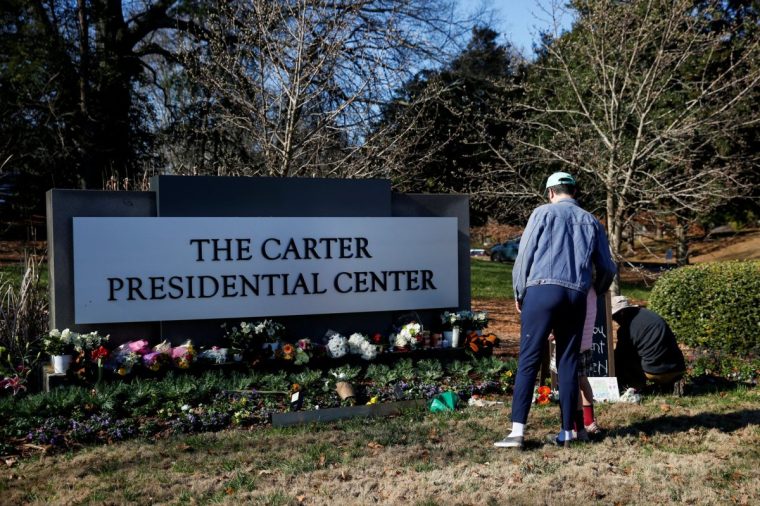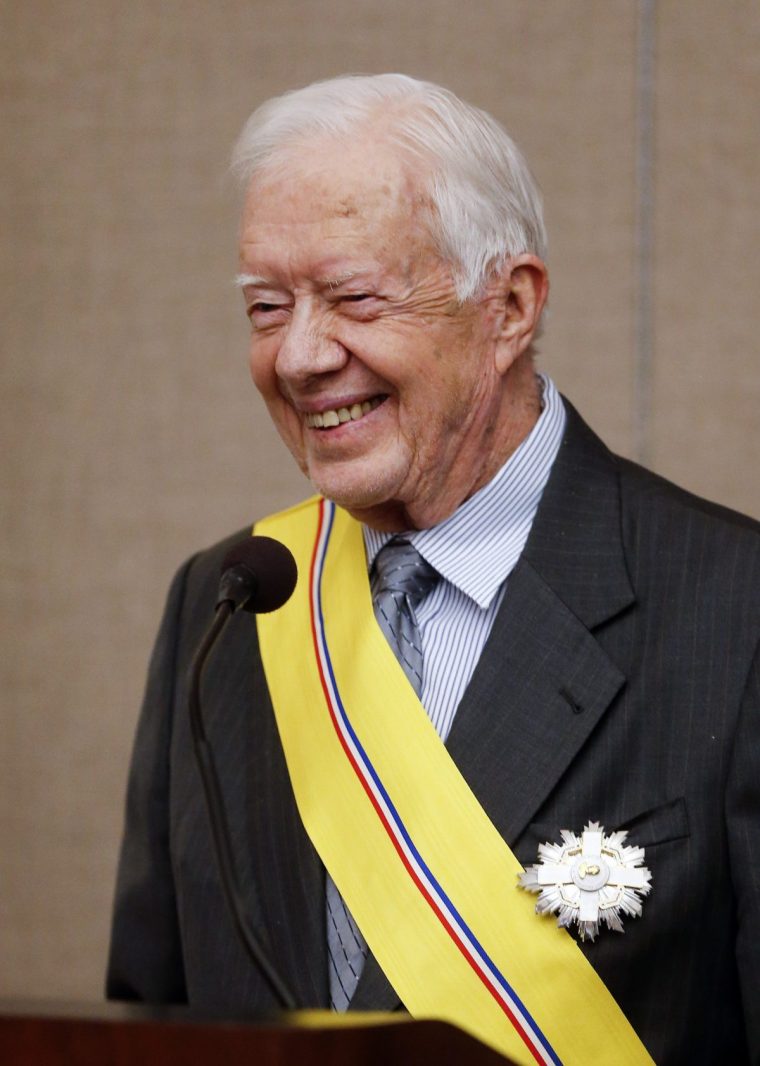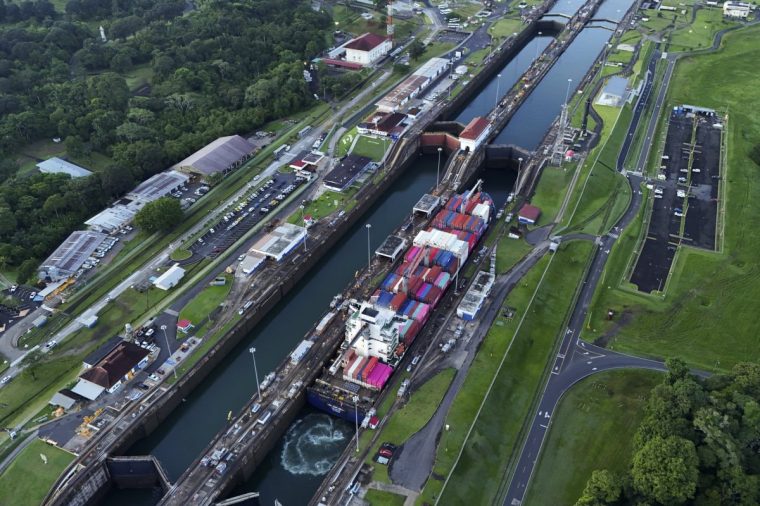Jimmy Carter had a firm handshake and eyes that sparkled with just a hint of mischief.
It was March 2004 and America’a 39th president had just published one of the several dozen books he authored over the course of his lifetime, this one entitled The Hornet’s Nest: A Novel of the Revolutionary War.
The invitation to talk with him at the Carter Centre in Atlanta, Georgia, was to publicise the book, and we were told that was the only subject he wished to discuss.

We were hoping he might be persuaded to talk about other topics, in particular the invasion of Iraq, which had been launched a year earlier by George W Bush and Tony Blair, but had already revealed it was not going to be the quick, clean, conquest the two leaders believed it would be.
It had also become clear Saddam Hussein had not possessed weapons of mass destruction, as the two Western leaders had claimed as their main justification for an invasion many believed illegal.
Truth be told, I was rather intimidated and utterly nervous, while trying and failing to disguise it. No matter one’s personal views of his time in office, here sitting opposite me was a former president of the United States.
And so I tried to play it cool, while Carter just emitted warmth. He must have been questioned by thousands of reporters. For me, he is the only leader of such stature I’ve interviewed during my career.

I’d gone equipped with a newly purchased digital recorder, but did not trust it. So, as I do today, I made copious shorthand notes as we spoke over the course of half an hour.
I realised I could not raise the issue of Iraq immediately. Even though Carter had left the White House more than two decades earlier – beaten in a landslide by Republican Ronald Reagan in 1980 – it was not common or customary for ex-presidents to criticise the actions of their predecessors.
So I started by asking about the War of Independence. Were there any lessons that could be drawn from the conflict by which America secured its independence from Britain to the events of the present day, I asked?
Yes there were, said the former president. One was the need to keep and maintain strategic allies and build trust with them. Had the US not secured the support of the French, George Washington’s troops might never have defeated the British.
And what about the present day? “Most wars, certainly not all, could have been avoided,” he said. “There was no reason for us to become involved in Iraq last year. That was a war based on lies and misinterpretations from London and Washington, claiming falsely that Saddam Hussein was responsible for 9/11, claiming falsely that Iraq had weapons of mass destruction.”
He said Bush “was inclined to finish a war that his father had precipitated against Iraq”.
He added: “That commitment of Bush prevailed over the better judgement of Tony Blair, who became an enthusiastic supporter of the Bush policy.”
At that moment, I realised I had my scoop. I hoped Carter had not sensed my beaming smile, though of course he was fully aware of the significance of what he was saying to a reporter and what any journalist would do with his comments.

After the interview concluded, I headed out into the sunshine and checked that digital recorder to ensure it had captured his comments on “tape”. It had.
A few days later The Independent ran the article under the headline: “Carter savages Blair and Bush: “Their war was based on lies.’”
A man from a different era
At the time we spoke, Carter felt like he belonged to a different era. He was charming, impeccably dressed and attentive as was talked in the foyer of his foundation, set on 35 acres of gardens and plants in the centre of the city.
Sun flooded through the windows. In the entrance were leaflets that outlined the centre’s work to tackle river blindness in Guatemala, and against guinea worm disease in more than 20 African and Asian nations.
The Carter Centre has over the years sent observers to more than 100 elections around the world, and more recently worked to support elections in the US.
These days it has become commonplace for politicians to talk of their opponents and rivals in terms utterly without precedent. No one is more guilty of this than Donald Trump, whose insults and attacks are so frequently and unnecessarily levelled, people become all but numb to them, and his way of operating almost normalised.
Because what Carter was doing 20 years ago was so uncommon, his words had all the more power.
He was often the target for Trump’s attacks, insulting him as a means of attacking Joe Biden, and claiming the man who grew up dirt poor in Plains, Georgia, would be happy as Americans were no longer ranking him as the worst of their chief executives.
In truth, Carter’s reputation has long been on the mend, in part because in many of the topics he devoted effort to – tackling climate change, getting more women judges on the bench, addressing social inequality – he has been shown to have been ahead of his time.
When, in 2023, pollster Gallup asked Americans to retrospectively evaluate Carter’s presidency, 57 per cent said they approved of the job he did, and 36 per cent disapproved. That would place him in lower half of presidents, better than Richard Nixon and Trump, and similar to George W Bush and Bill Clinton.
Ironically, one of the things Carter viewed as a lasting achievement were the Torrijos-Carter Treaties, which gave Panama control of the Panama Canal.

In recent days, president-elect Trump has been vowing to tear up the documents and demand the canal’s return. “We’re being ripped off at the Panama Canal like we’re being ripped off everywhere else,” Trump claimed at an Arizona rally last week.
In our conversation, there was no reason for the subject of Trump to come up. It feels fair to say, based on what Carter has said publicly about him, he did not think very warmly of the New Yorker.
In 2019, Carter said he did not believe Trump would have won the 2016 election without Russian “interference”. Speaking ahead of the 2020 election he said: “I think it will be a disaster to have four more years of Trump.”
As it was, as news broke of Carter’s death, Trump felt moved to issue a statement that paid tribute to him.
“The challenges Jimmy faced as President came at a pivotal time for our country and he did everything in his power to improve the lives of all Americans,” said the incoming president. “For that, we all owe him a debt of gratitude.”
In 2023, Carter’s family announced he had entered hospice care and was no longer taking cancer treatments. In November that year, his ally and wife of 77 years, Rosalynn, died aged 96.
Carter kept going against the odds, making it to the age of 100, a record for a US president.
After our interview was concluded, Carter gave me another smile and said: “I’ve enjoyed our conversation.”

